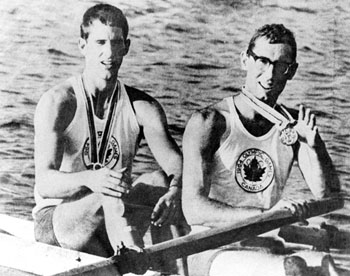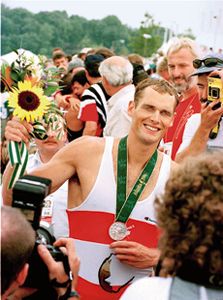George William Hungerford, OC, rower, corporate lawyer (born 2 January 1944 in Vancouver, BC). George Hungerford and Roger Jackson came out of nowhere to win the gold medal in the coxless pairs at the 1964 Olympic Summer Games in Tokyo. Having been cut from Canada’s rowing eights crew, they became known as the “Golden Rejects.” They were the only Canadian athletes to win gold in Tokyo that year. They received the 1964 Lou Marsh Trophy (Northern Star Award) as Canada’s athletes of the year. Hungerford was forced to retire from rowing in 1965 and later worked as a corporate lawyer. He has been inducted into Canada’s Sports Hall of Fame, the BC Sports Hall of Fame and the Canadian Olympic Hall of Fame. He was made an Officer of the Order of Canada in 1984.

Childhood and Family
George Hungerford was the oldest child of Mary and Roderick Hungerford. He had two younger brothers (Robert and John) and two younger sisters (Mary and Catherine). He attended Shawnigan Lake School on Vancouver Island, which was known for its rugby and rowing programs.
Hungerford married Jane Knott and they had four children: Geordie, Michael, Andrew and Janie.
Hungerford’s niece, Rebecca Marino, was one of Canada’s top female tennis players and was at one time ranked 38th in the world.
Life at UBC
George Hungerford attended the University of British Columbia (UBC) starting in 1961. In his first two years, he played rugby and squash. However, while playing rugby, Hungerford suffered a shoulder injury. He joined the UBC rowing program to maintain his fitness. (He had learned rowing in high school.) Hungerford soon realized that if he wanted to represent Canada at the Olympic Summer Games, rowing would be his best option. (At the time, rugby and squash were not part of the Summer Olympics.)
UBC was known for rowing excellence. Many rowers from Western Canada had connections to UBC. UBC rowers had won a gold medal in the men’s coxless fours (Canada’s first ever gold medal in rowing) and a silver medal in the men’s eights at the 1956 Olympic Summer Games in Melbourne, as well as a silver medal in the men’s eights at the 1960 Olympic Summer Games in Rome.
UBC rowing coach Glen Mervyn liked what he saw from Hungerford and assigned him to the school’s eights program in 1963. Hungerford was part of the UBC team that beat St. Catharines at the 1964 Canadian Rowing Championships and Olympic Trials.
Bout with Mononucleosis
Prior to the 1964 Olympic Summer Games in Tokyo, George Hungerford got very sick, and it was determined he had mononucleosis. The illness came a little more than two months before the Olympic Games were to begin.
At the time, there was no treatment for mononucleosis. The only remedy George received from the doctors was bed rest. When Hungerford was healthy enough to return to row, he was reassigned. Coach Mervyn did not believe Hungerford was strong enough to compete in the eights. He was replaced by Wayne Pretty, who had won a silver medal in the men’s eights at the 1956 Olympics in Melbourne.
1964 Tokyo Olympics
Cut from the eights crew due to illness, George Hungerford was assigned to compete with Roger Jackson of Toronto, Ontario, in the men’s pairs. Neither was pleased with not being part of the eights — particularly Hungerford, who had never competed in pairs. The 1964 Olympic Games were only a short time away, but it took time for Jackson and Hungerford to gel. They were also without a coach, since the focus of the Canadian Olympic Association (now the Canadian Olympic Committee) was completely on the eights.
When Jackson and Hungerford arrived in Tokyo, they had a training session using a handcrafted boat built by American George Pocock. They had a very fast training time, but the Canadian coaches assumed their stopwatch wasn’t working and did not tell them what their time was.
Hungerford and Jackson then had the fastest time in the heats. In the final, they posted a winning time of 7:32.94, narrowly beating the favoured Netherlands by 0.46 seconds.
Hungerford and Jackson were the only Canadian athletes at the 1964 Tokyo Olympics to win gold. At the time, many Canadian journalists did not attend rowing races. The national focus that day was on sprinter Harry Jerome, who won the bronze medal in the men’s 100 m. The Canadian men’s eights, who did not have Hungerford or Jackson in their crew, finished a very disappointing ninth place. Hungerford and Jackson’s gold medal victory was completely unexpected, earning them the nickname the “Golden Rejects.”
Other Activities
George Hungerford earned his Bachelor of Arts at UBC in 1965. That same year, he competed with Jackson at the prestigious Royal Henley Regatta in England. During the event, Hungerford was encouraged by doctors to give up rowing permanently, since they were concerned about the impacts of a blood disorder he was dealing with.
Hungerford earned his law degree from UBC in 1968. He then founded his own firm to practice corporate law.
Hungerford also served on the boards of the Salvation Army and the BC Cancer Foundation and as chair of the BC Sports Hall of Fame and Museum.
Honours
George Hungerford and Roger Jackson received the Lou Marsh Trophy (now the Northern Star Award) as Canada’s athletes of the year in 1964. Hungerford was inducted into Canada’s Sports Hall of Fame in 1964, the BC Sports Hall of Fame in 1966, the Canadian Olympic Hall of Fame in 1971 and the UBC Sports Hall of Fame in 1994.
(See also Canadian Gold Medal Winners at Olympic Summer Games; Canadian Gold Medal Winners at Olympic Winter Games

 Share on Facebook
Share on Facebook Share on X
Share on X Share by Email
Share by Email Share on Google Classroom
Share on Google Classroom



